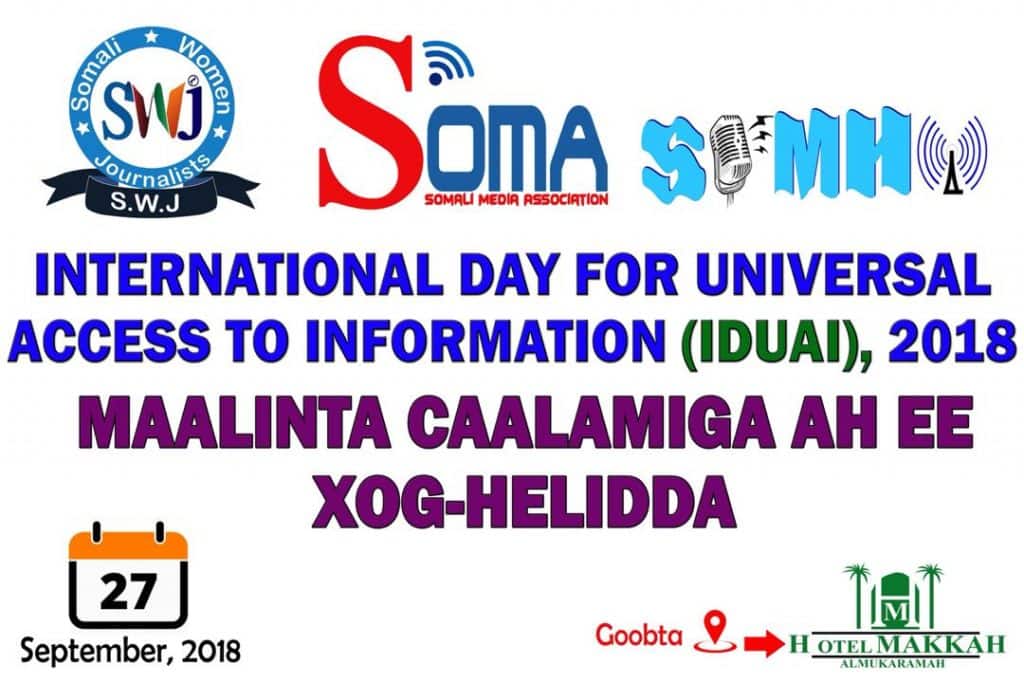Mogadishu, Thursday, September 27, 2018: An event observing the International Day for Universal Access for Information jointly organized and conducted by the Somali Media Association (SOMA), Somali Women Journalist (SWJ) and the Somali Independent Media Houses Association (SIMHA) has been held today in Mogadishu, Somalia.
The event has been held at Hotel Maka Almukaramah in Mogadishu on September 27, 2018.
Forty persons comprising mainly Directors and members from the various radio stations, TV stations, SOSCENSA, PHRN, local newspapers, Spokesperson from Banadir regional authority, NUSOJ, intellectuals and Jobkey University were the main participants in the one-day event.
The main purpose of the event was to highlight and elaborate on the importance of access to information for all the Somali community, and that every individual has the right to know and receive information.
Presentations, debates and speeches signifying the event has been made during the observation of the event.
In his preliminary presentation, Mr. Ahmed Esse Guutaale, Director of Radio Mustaqbal in Mogadishu has made brief background of the various stages access for information in Somalia has passed through the years both in the past and present.
The media law classifies the media as: the independent Media such as the radio, TVs, Newspapers, public service broadcasting which is independent from the interest of the politicians and the Community media, Mr. Ahmed mentioned.
During the presentation, it was highlighted that there is problem of inviting limited number of the independent media outlets to access news and information from the Somali government, and mostly edited information by the government is distributed through emails or by spokespersons, and there is need for addressing this issue through discussions by all the concerned stakeholders for improving access of information.
Mohamed Abduwahab, Secretary General of SOMA pointed out that SOMA, SWJ and SIMHA has decided to commemorate the International day to access information, and indicated information is not only required from the government; but the civil society are expected to provide information on their part as well to keep the public informed.
“This is because the media has progressed and the social media is used, and sometimes fake news are spread out, that prompts the need to get accurate information, for example, today some of the roads were closed , and it’s important to get information on the reason for their closure which were not disclosed “ Mr. Mohamed Abduwahab explained.
“Finally, I request the government and the civil society to cooperate with the media on how they could access information.” The Secretary General of SOMA said.
Farhia Mohamed Khayre, Chairperson of SWJ explained the local Somali media could not be compared with the international media saying news regarding to the government leaders is being edited and sent to the Somali media to avoid the local media overstate the negative and sensitive aspect of the speech by the leaders.
Hassan Ali Geesey, Chairperson of SIMHA indicated there is need to check the available information to release accurate version, and it’s not to broadcast every other information received. “There are unqualified people who share the brand name of journalist with us who are damaging our reputation; we have to unite against them.” He added.
In his part, Farah Omar Nur from NUSOJ requested government officials to make all the efforts to provide information to the reporters for releasing to the public.
Salah Omar Hassan (Salah Dheere), the spokesperson of Banadir Regional Administration pointed out the problem is that the Somali community is considered to be interested in information, however, does not seek official information. He suggested this approach to be changed.
In November 2015, UNESCO adopted a resolution declaring September 28 of every year as International Day for Universal Access to Information (IDUAI).

